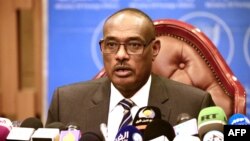The process of removing Sudan from the U.S. list of states sponsoring terrorism will start soon, Sudan’s top diplomat told VOA in an exclusive interview.
El-Dardiri Mohamed Ahmed said his meetings with U.S. officials were effective in convincing Washington that Sudan has taken measures against terrorism and that it is time to begin the process of removing the country from the U.S. State Department’s list of states sponsoring terrorism.
“We feel that U.S. officials are ready to listen to Sudan and are ready to evaluate the situation on the basis of developments that are currently taking place in Khartoum. They are very much appreciative of the efforts that have been taken by Sudan,” el-Dardiri said.
El-Dardiri did not elaborate on the timeframe, but U.S. charge d’affaires in Sudan, Steven Koutsis said Tuesday that if it is determined that Sudan met all the statutory criteria, the U.S is prepared to begin.
Designation history
Sudan was designated a state sponsoring terrorism in 1993 during the Clinton administration. The country was also hit with U.S. sanctions over Khartoum’s alleged support for multiple terror groups, including al-Qaida, Hamas and Hezbollah.
Osama bin Laden and his followers lived in Sudan between 1992 and 1996.
But Foreign Minister el-Dardiri said the designation was politically motivated at the time.
“When Osama bin Laden was in Sudan, he had nothing to do with terrorism. Bin Laden Group construction company entered Sudan to start a development project of an airport,” el-Dardiri said.
“No particular terrorist attack was ever traced to Sudan, and no particular terrorist was named as a person who has taken Sudan as a refuge within the period in which we were listed as a state sponsoring terrorism,” he added.
The former leader of the al-Qaida terror group, bin Laden did live in Sudan for years before going to Afghanistan in late 1990s.
Human rights
Human Rights Watch and Amnesty International have criticized Sudan and documented abuses and atrocities carried out by Sudan’s security forces including ethnic cleansing in Darfur, prisoner abuse, persecution of human rights defenders, and prosecution of religious minorities.
El-Dardiri said that his country has improved its human rights records and works with the U.N. to further improve it.
“We are working closely with the United Nations Human Rights Commission. Over the period of the last two years, Sudan human rights records has improved immensely,” el-Dardiri said, acknowledging that challenges still exist.
A U.S. State Department official, speaking to VOA last month about the prospects of Sudan’s removal from the U.S. list, also raised the issue of human rights.
“If we conclude that Sudan has sufficiently built upon the positive actions it has taken, including by improving respect for human rights, enhancing humanitarian access, and advancing Sudan’s peace process, and determine that the relevant statutory criteria have been met, we would consider beginning the process to rescind Sudan’s State Sponsor of Terrorism designation,” the official said.
Economy
Sudan’s economy continues to deteriorate because of surging inflation, a high foreign debt, and the loss of oil revenue because of the secession of South Sudan in 2011.
Last year, the Trump administration lifted sanctions on Sudan and withdrew the country’s name from the list of countries with travel restrictions. The hope, at least inside Sudan, was that the removal of sanctions would help revive the economy.
That has not happened, Sudan’s economy remains in crisis.
While officials blame it on sanctions, some analysts blame poor government economic policies and rampant corruption.
Omer Ismail, a senior policy adviser at Enough Project, a Washington-based think tank that studies conflicts in Africa, says the Sudanese government is responsible for the economy.
“The regime is built on corruption and managed to steal the country’s resources. Businesses through government contracts managed to transfer money out of Sudan. That is why the economy suffered multiple times and became worse even than before the economic sanctions were lifted,” Ismail said.
“Measures have been taken in the country to address issues related to corruption. We have started a crackdown on corrupted entities, and this is a process that will be continuing, it’s an ongoing process,” el-Dardiri said.
El-Dardiri added that sanctions are badly affecting Sudanese economy and affecting the average Sudanese.
South Sudan
The conflict between the central Sudanese government and the Sudan People’s Liberation Army resulted in the secession and subsequent independence of South Sudan.
Hundreds of thousands of people have reportedly died as a result of the conflict, famine and diseases caused by war.
El-Dardiri said that Khartoum is optimistic about reaching a peace agreement with South Sudan.
“We have peace agreement with South Sudan and is right now entering its second month. It is very early to tell whether this peace will hold or not. We are very much optimistic,” el-Dardiri added.





